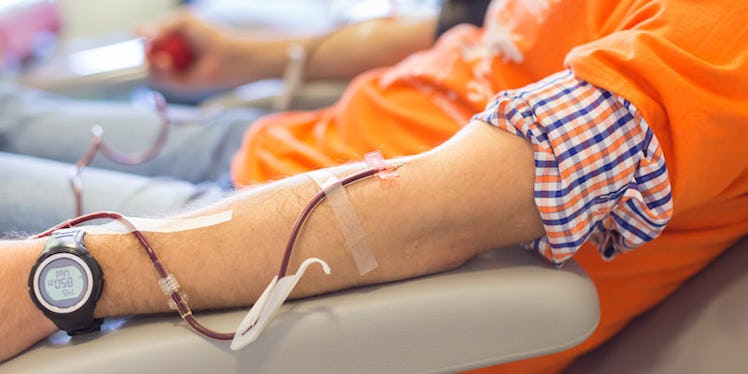
5 Reasons You Should Reconsider Becoming A Blood Donor This Month
January has been designated National Blood Donor Awareness Month for a reason.
Not only has it become the most difficult month for blood centers to get donations, but it is also one of the most highly demanded times of year.
Blood is in dire need.
According to the Association Of Donor Recruitment Professionals,
Every day in our country, approximately 39,000 units of blood are required in hospitals and emergency treatment facilities for patients with cancer and other diseases, for organ transplant recipients and to help save the lives of accident victims.
Once I turned of age, I began donating as often as I could.
I’ve never really had a motive to do so other than it is just the right thing to do.
Almost every month in college, there would be signs for blood drives.
Those signs became more frequent as time went on because there was a shortage of blood in the area we lived in.
Curious about why this was, I asked one of the phlebotomists at the drive why this was occurring.
She was quick to explain many of the excuses from people who are afraid and don’t donate blood:
1. “I hate needles.”
It’s no secret many people have a deep fear of needles.
It’s completely understandable.
Who would want someone puncturing his or her body with a sharp object?
In my own experience, the more often I gave blood, the less scary it became.
Most times, I close my eyes while the phlebotomist places the needle. Then, I don’t even feel it.
The actual drawing process causes little to no discomfort.
To be honest, the most pain I’ve ever felt is the finger prick at the beginning of the process, when the doctor tests my iron levels.
2. “I don’t think I’m eligible to donate.”
A lot of people aren’t sure if they are able to donate for a number of reasons.
These reasons could range from a recurring illness, low weight, getting a tattoo or piercing or even traveling out of the country.
The good news is, donation eligibility is constantly changing.
Check out the American Red Cross blood donation eligibility requirements before ruling yourself out.
You may be surprised.
3. “My blood type isn’t in demand.”
According to the Miller Keystone Blood Center,
Blood centers often run short of type O, A and B blood, but shortages of all types of blood occur during the summer and winter holidays. If all blood donors gave at least twice a year, it would help prevent blood shortages.
You may see a certain type of blood in demand, but that doesn’t mean you shouldn’t donate if yours is a different type.
All types are always in demand.
Some are just in dire demand.
4. “I’m afraid they’ll take too much, and I’ll feel weak.”
The professionals taking your blood will not take more than is safe.
After a donation, you are not allowed to donate for another 56 days.
During this time, your body naturally replenishes the blood you have donated.
Some may feel a bit weak after donating, but it’s important to eat a good meal and drink plenty of water before and after you give.
The organizers of the blood drive will not let you leave until you are good and ready to do so.
5. “I’m too busy, and I just don’t have the time.”
Giving blood takes less than an hour of your time.
It's safe and easy. It’s a simple way to potentially help save a life (or three).
If you are unable to make it to your local school or community drive, you can contact your local Red Cross to schedule a time that works better for you.
Most of the time when I donate, I stay connected to my phone to do work.
This way, I kill two birds with one stone.
It just goes to prove that if you are physically eligible to give blood, there really are no excuses.
Come on, you get juice and cookies after.
I’m so there.